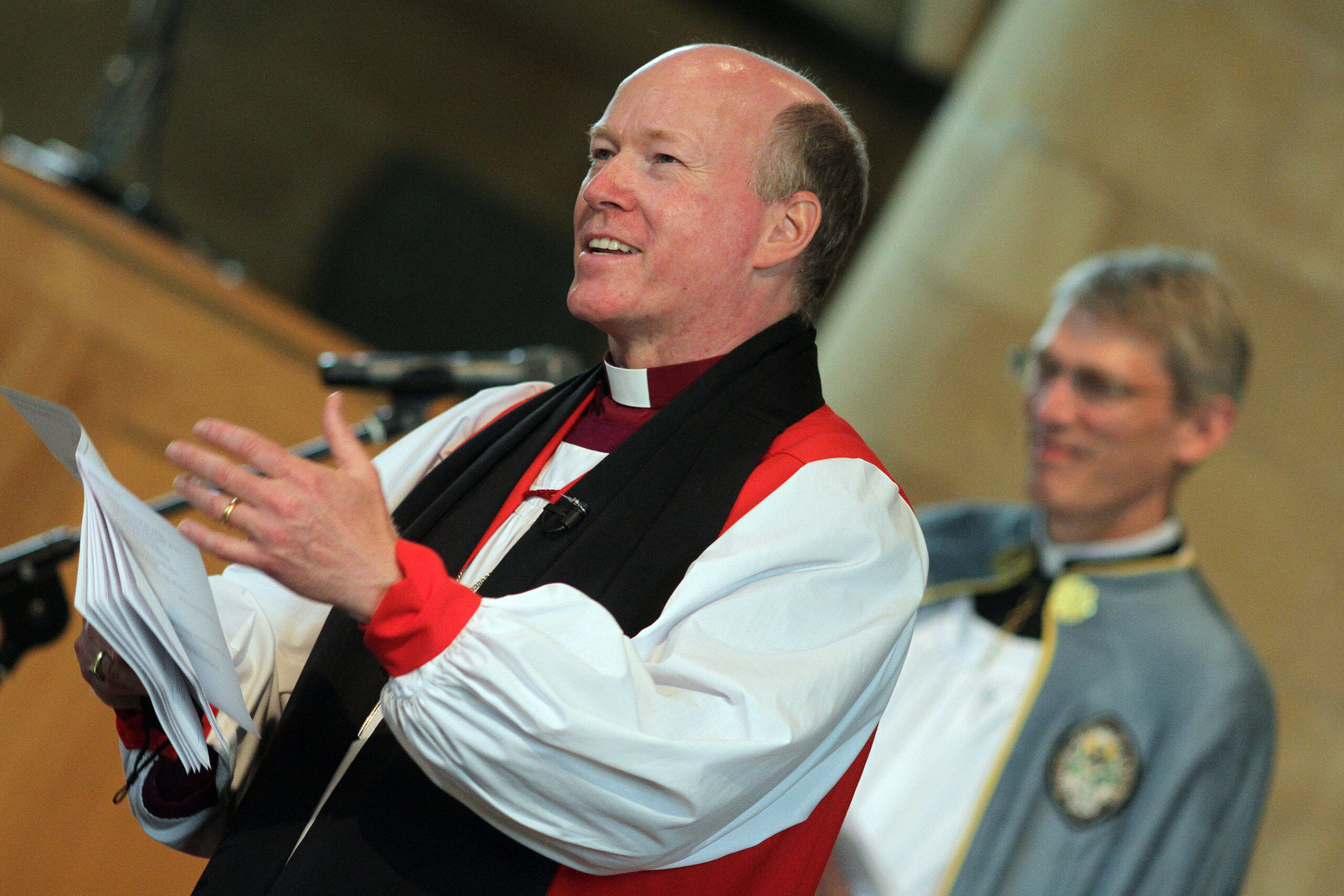Bishop’s Address to Diocesan Synod – 14th May 2022
I want to begin my address to this Synod by thanking you all for your different ministries as the people of God across the diocese. Over these past few years through all the many challenges and changes we have been living through, I have frequently turned to one of Paul’s prayers in 1 Thessalonians 1:
“We always thank God for all of you and continually mention you in our prayers. We remember before our God and Father your work produced by faith, your labour prompted by love, and your endurance inspired by hope in our Lord Jesus Christ.”
And I am never more inspired to pray this than when I have been with one of our parishes in vacancy, which made my experience of Holy Week particularly heartening visiting St Mary’s Sutton-in-Ashfield on Maundy Thursday and then Blyth with Scrooby and Ranskill on Good Friday. Let me assure you that bishops and archdeacons continue to give considerable thought and care to recruiting and discerning the appointment of clergy to vacant parishes. However, this is focused not simply on filling vacancies but appointing people who will flourish in a particular role with its own opportunities for mission and growth.
I give thanks to God for you all, perhaps especially ‘your endurance inspired by hope in our Lord Jesus’. The landscape of our lives and world have changed dramatically in just two and a half years. We could not have imagined what has happened: the worse pandemic for over 100 years, still affecting our everyday lives and even now devastating parts of our world; which then precipitated a cost of living crisis that is likely to get worse before it gets better, with the poorest and most vulnerable at greatest risk; and since mid-February there is war in central Europe with horrendous loss of life and millions now displaced or refugees, as well as the impact it will have on our defence objectives and security threats for a generation to come.
Then of course, some of you, I know, have also processed significant change in your lives, including painful losses, disappointments and personal struggles. And it continues to be very hard.
Put simply, someone once said ‘the world at its worse needs the church to be at its best’. Also, in Holy Week we were able to host the first in-person service for the renewal of ministry in three years, and I am so thankful that in this service we welcomed nearly 80 new clergy and licensed lay readers since the last time we had met. And we pray that God will continue to raise up many more to new ministries of various kinds as we continue to be the church of Jesus Christ for the sake of the world he loves.
For this reason, we are reviewing and refreshing our diocesan vision in Growing Disciples which Bishop Andy will introduce later. But let me say that amidst all the dramatic changes in the world, and all the challenges and opportunities before us as the church, there are some things that do not change. And having recently passed my 7-year anniversary as diocesan bishop, I thought I should share with this Synod some of the core convictions that continue to shape my own approach to life and ministry with you and among you.
They are going to sound very familiar, and I know that while some of you may express them differently, many of you share these convictions, and you have helped me to grow in them. I have limited them to 7 for 7 years.
First, There is nothing better anyone can do with their life than become a follower of Jesus Christ – I believe this with all my heart, not because becoming a follower of Christ is choosing an easy life (far from it) but because it is a life full of the abundance of God’s transforming presence: above all his comfort, encouragement and hope. And there is not a single person living anywhere in this diocese who has no need for God’s transforming love in their life.
Second, The most interesting and compelling thing about the church is God – Dr Jane Williams reminded and inspired many of us to recover this confidence when she spoke two years ago at our diocesan conference. We don’t need to panic in trying to make ourselves ‘relevant’ as though that is all that matters. People change – we change – when we encounter the living God.
Someone recently commended to me a new book by a practical theologian, called Andrew Root. It’s called ‘Church and the Crisis of Decline – a hopeful practical ecclesiology for a secular age’. The cover says ‘If you are worried about the fate of your church (and who isn’t these days?) this is a book you must read’. Andrew Root argues very persuasively that the church’s primary crisis is not in the lack of resources but in the loss of life, which can return only when we remain open to God’s encountering presence.
He explains that the cultural framework of the secular world is an immanent one (that means it derives from what is physically tangible to us in the here and now). And Root says this world view “has burrowed its way deep into our imagination, clouding our vision for a living God who speaks and moves in our lives and in our world.” This is why we need to be attentive to experiencing the transcendence of God, where heaven touches earth, above all as we open the bible and worship and pray, but also in relational ways together and in observing creation itself. So Andrew Root concludes, “What therefore makes a congregation beautiful is its life, not its numbers, programes or access to resources. A community that is alive is beautiful, whether it is six or six hundred.”
Third, There is no way to re-evangelise our nation apart from the impact of the daily lives of ordinary, everyday Christians. And so ‘making whole-life missionary disciples is the core vocation of the church’,it always has been and always should be. The Lambeth Conference this summer will gather Anglican bishops from around the Communion, where we can learn together and what this will mean as we face the greatest challenges in our world together: not only evangelism today, but addressing poverty, racial injustice, war, and caring for creation. These are some of the many issues of discipleship that touch on our everyday lives.
Fourth, You measure the spiritual health of a church not by its seating capacity but its sending capacity – we don’t just want 10 or 20 larger resourcing churches in the diocese, we want every church of every size to be a church that is ‘growing to give itself away’, which is the way of Christ. And some of the most moving and exciting initiatives over the past 5 years have happened in smaller churches who are resourcing new ministry and mission.
Fifth, God’s abundance not our scarcity should be the primary inspiration for worship, prayer and witness, as well as our giving – we cannot out-give God, but all the talk of money can be weary making and increase our anxiety. The new funding from the Church Commissioners is something we can be thankful for, but we need to continue to live and love and give out of the abundance of God’s life and self-giving love for us.
Sixth, Good governance is integral to the mission of the church and striving for excellence in safeguarding should be everyone’s responsibility – our worship and mission is vacuous if we overlook the need for safer caring of children and ‘at risk’ adults, including refugees, because ‘God sees’ (El Roi), and we are never closer to his heart, or more likely to learn about our own heart, than when we move the orientation of our best attention towards the needs of the most vulnerable people in the church and beyond.
On a personal level this has been part of the experience for my wife Sarah and me over these past ten years as foster carers, as well as for me as a bishop in the church. And since attending to the most vulnerable matters so much to God, safeguarding cannot be an optional add on but rather at the heart of our discipleship; we must therefore keep working and learning together.
We all have a part in this, not just bishops and safeguarding advisors and clergy. It can become part of the Good News of the Spirit of God at work in his church.
Seventh, Personal renewal in our lives and spiritual revival in the church happens when hearts are surrendered and re-surrendered to God, especially in prayer. This is where we will find out whether we are becoming a humbler, bolder and simpler church! It is in our commitment to prayer and how we pray for one another, with compassion and kindness, and in praying for our world. This autumn as bishops we will be inviting the diocese to share in a monthly day of prayer, on the second Thursday of the month, while we seek the Lord and his presence together, discerning God’s vision for his church.
These are some of the convictions that will go on shaping my ministry with you and I am sure we could identify more, but there is plenty of time for that in the days to come. In light of the mission that we all share in, with the ‘still speaking and moving God of the Bible’, I conclude by inviting you to watch the new ‘welcome to the diocese’ video that expresses very succinctly what inspires us most.



